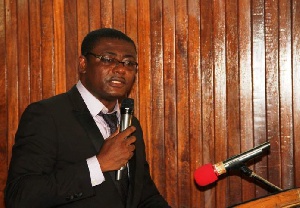Business News of Monday, 23 July 2018
Source: thebftonline.com
VRA, APUA hold workshop for Anglophone power utility trainers in Accra
About thirty delegates and other institutional trainers from different power utility companies across Africa have converged in Accra for a training workshop geared toward enhancing the skills, technical capacities and attitudes of trainers in the power sector.
The three-day workshop, organised by the Association of Power Utilities of Africa (APUA) through the African Network of Centres of Excellence in Electricity (ANCEE) and hosted by the Volta River Authority (VRA) Academy, aims to provide the skills that will enable trainers to lead and successfully manage actions undertaken as part of the global approach to sharing experiences at the heart of an operational network.
Speaking to the B&FT, Acting Chief Learning Officer (CLO) and head of the VRA Academy, Eric Mensa Bonsu said: “We always do capacity assessment gaps within the framework of AMCEE and APUA. This was done about 3 to 4 years ago and we started rolling out the training interventions. In the process, we realised that there was a skills gap also in the areas of those who offer the training, and this informed the kind of follow-up training to build the capacities of trainers in the centres to deliver.
“The training centres here have been identified to train the whole of Africa, since every country on the continent has power but not all have training centres. The takeaway is that trainers will be well-equipped to train staff from other African countries,” he added.
Commenting on the areas of low capacity they had identified, Eric Mensah Bonsu said of the three training areas behavioural attitudes was an area of concern across power utility companies, as workers exhibited poor working attitudes.
“When we talk about training, we are talking about three things. One is the skills, second is the knowledge and third is the attitude. To a large extent, the power utilities are doing their best when it comes to the knowledge and the skills,” he said.
“The area that we fall short in is attitude. Most guys are good when it comes to the technical field, but the behavioural side is where we have some challenges. Issues such as coming to work late and not fixing problems on time are areas that we identify to be a huge gap,” he lamented.
He said that since the issue has to do with attitudes which are becoming embedded in our culture, it is becoming increasingly difficult to address.
“This is one of the issues that this training is seeking to address: how do you train people to change behaviours and attitudes? There must be a system in place to be integrated into the whole portfolio of training,” he concluded.
In a speech read on his behalf the Chief Executive Officer of the VRA, Emmanuel Antwi-Darkwa said: “The overall objective of the workshop is to enhance performance of the electricity sector and to intensify regional exchanges by strengthening technical and managerial capacities in the various fields.
“The training will also provide trainers with skills and tools for training other trainers at national level in this regard,” he added.
The CEO was certain that the workshop will build the competence and confidence of trainers to organise and deliver training sessions for their peers at the national level. He therefore encouraged all participants to share ideas and best practices based on real-life situations.
APUA is a network of all power utilities in Africa, with AMCEE being a sub-committee that focuses on capacity building. Under this arrangement, training centres of excellence have been identified to carry out the capacity building training requirement of member-states.
Participants include trainers from VRA, ECG and GRIDCO from Ghana, and other power utility companies from Sudan, Zimbabwe, Ethiopia and Lesotho.
Others representatives at the workshop were those from Namibia, Angola, Mozambique and Kenya.
The rest are Liberia, Nigeria, Rwanda, Libya, Botswana, Gambia, Malawi and Uganda.
Entertainment










